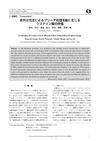 116 citations,
December 2017 in “International Journal of Women's Dermatology”
116 citations,
December 2017 in “International Journal of Women's Dermatology” Adult female acne treatment should be personalized, considering individual preferences and pregnancy, using various topical and oral medications while managing side effects and resistance.
 71 citations,
September 2006 in “Cell Transplantation”
71 citations,
September 2006 in “Cell Transplantation” Fetal skin cells from a cell bank heal wounds faster and with less scarring than adult cells.
 67 citations,
August 2013 in “International Journal of Cosmetic Science”
67 citations,
August 2013 in “International Journal of Cosmetic Science” Hair greying is caused by oxidative stress damaging hair follicles and melanocytes.
 65 citations,
February 2009 in “The journal of investigative dermatology/Journal of investigative dermatology”
65 citations,
February 2009 in “The journal of investigative dermatology/Journal of investigative dermatology” Anti-acne medications may work by reducing the activity of a protein involved in acne development.
62 citations,
July 2022 in “Science Immunology” TREM2 macrophages and unsaturated lipids contribute to acne inflammation.

research Acne
58 citations,
January 1997 in “Dermatologic Clinics” Acne significantly affects mental health and quality of life, with research suggesting hormonal and genetic factors in its development and emphasizing early treatment to prevent scarring.
 51 citations,
September 2015 in “Medical Clinics of North America”
51 citations,
September 2015 in “Medical Clinics of North America” The conclusion is that acne, alopecia, and hyperhidrosis are common skin issues with various treatments available, and accurate diagnosis is key for effective management.
 42 citations,
September 2018 in “Journal der Deutschen Dermatologischen Gesellschaft”
42 citations,
September 2018 in “Journal der Deutschen Dermatologischen Gesellschaft” Adult female acne requires a comprehensive treatment approach, including medical options and lifestyle changes, with attention to psychological well-being.
 40 citations,
February 2002 in “International Journal of Dermatology”
40 citations,
February 2002 in “International Journal of Dermatology” Permanent hair dye damages hair but it mostly recovers after 8 weeks; using certain hair care products can help repair it.
 38 citations,
November 2012 in “Expert Opinion on Drug Safety”
38 citations,
November 2012 in “Expert Opinion on Drug Safety” Common acne treatments can cause various side effects, like skin irritation and more serious issues, but combination therapies are often more effective and better tolerated.
 30 citations,
June 2015 in “British Journal of Dermatology”
30 citations,
June 2015 in “British Journal of Dermatology” Acne is common in women, often hormone-related, negatively affects quality of life, and requires various treatments.
28 citations,
January 1986 in “International Journal of Dermatology” A pregnant woman developed a rash caused by a yeast infection, not acne.
 22 citations,
January 2014 in “International Journal of Trichology”
22 citations,
January 2014 in “International Journal of Trichology” Hair restoration surgery can lead to swelling, infections, scarring, numbness, hiccups, and poor hair growth.
 21 citations,
April 2019 in “Endocrinology and Metabolism Clinics of North America”
21 citations,
April 2019 in “Endocrinology and Metabolism Clinics of North America” Transgender patients need proper skin care, especially when undergoing hormone treatments, to manage issues like acne and hair loss.
 16 citations,
January 2011 in “Indian Journal of Dermatology, Venereology and Leprology”
16 citations,
January 2011 in “Indian Journal of Dermatology, Venereology and Leprology” Indian dermatosurgical practitioners were given guidelines in 2011 to reduce infection risks, including hand hygiene, sterilization methods, operation theater standards, and proper waste disposal.
 15 citations,
January 2016 in “Dermatologic Clinics”
15 citations,
January 2016 in “Dermatologic Clinics” Start acne treatment early to prevent scarring, consider antibiotic resistance, use maintenance therapy, and manage side effects carefully.
 14 citations,
October 2020 in “Scientific reports”
14 citations,
October 2020 in “Scientific reports” Hair greying is linked to reduced ATM protein in hair cells, which protects against stress and damage.
 12 citations,
January 2020 in “Analyst”
12 citations,
January 2020 in “Analyst” Researchers found markers that can tell if hair has been bleached, which could improve hair test accuracy.
 12 citations,
September 2018 in “International Journal of Cosmetic Science”
12 citations,
September 2018 in “International Journal of Cosmetic Science” Palmitoyl tetrapeptide-20 may help reduce hair greying and increase melanin production.
 12 citations,
December 2017 in “Food and chemical toxicology”
12 citations,
December 2017 in “Food and chemical toxicology” Permanent hair dye mixtures can irritate and damage the skin.
 12 citations,
May 2015 in “Molecular Medicine Reports”
12 citations,
May 2015 in “Molecular Medicine Reports” Troxerutin helps protect skin cells from oxidative stress and may be good for treating hair loss.
11 citations,
June 2018 in “Annales de dermatologie et de vénéréologie” Hair care products can cause skin irritation and allergies.
 10 citations,
January 2017 in “Journal of Evidence-Based Complementary & Alternative Medicine”
10 citations,
January 2017 in “Journal of Evidence-Based Complementary & Alternative Medicine” Some vegetables from Northern Thailand show promise for health benefits, including hair loss treatment and antioxidant properties.
 10 citations,
January 2017 in “Expert Opinion on Pharmacotherapy”
10 citations,
January 2017 in “Expert Opinion on Pharmacotherapy” The conclusion is that more research is needed to better understand and treat adult acne, and that patient education and simple treatment plans are important for better results.
10 citations,
June 2011 in “PubMed” Most skin care products are safe during pregnancy, but avoid hydroquinone and tretinoin.
 9 citations,
March 2011 in “Oxidative stress and disease”
9 citations,
March 2011 in “Oxidative stress and disease” Some herbal treatments are effective for skin disorders, but more research and regulation are needed.
 8 citations,
June 2021 in “Frontiers in Bioengineering and Biotechnology”
8 citations,
June 2021 in “Frontiers in Bioengineering and Biotechnology” Extracts from Alnus sibirica and oregonin may help with hair growth and prevent hair loss.
 8 citations,
January 2016 in “Journal of fiber science and technology”
8 citations,
January 2016 in “Journal of fiber science and technology” Bleaching hair increases cysteic acid levels in a predictable way.
 8 citations,
May 1998 in “Journal of Oral and Maxillofacial Surgery”
8 citations,
May 1998 in “Journal of Oral and Maxillofacial Surgery” Acne is caused by increased sebum, abnormal skin shedding, bacteria, and inflammation, not dirt; treatments vary from creams to antibiotics or isotretinoin, with severe cases needing a dermatologist's care.
 7 citations,
November 2013 in “Pediatrics in Review”
7 citations,
November 2013 in “Pediatrics in Review” Acne is a chronic skin condition not caused by poor hygiene or diet, and it requires long-term treatment and patient education.

























